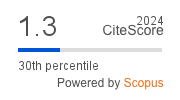Potency of Stichopus hermanii extract as oral candidiasis treatment on epithelial rat tongue
Downloads
Downloads
Greenberg M, Glick M. Burket's oral medicine: diagnosis and treatment. 10th ed. New York: BC Decker Inc.; 2003. p. 564-8, 570-2.
William D, Lewis M. Pathogenesis and treatment of oral candidosis. J Oral Microbiol 2011; 3: 5771.
Netea MG, Brown GD, Kullberg J, Gow NA. An integrated model of the recognition of Candida albicans by the innate immune system. Nat Rev Microbiol 2008; 6(1): 67-78.
Niimi M, Firth NA, Cannon RD. Antifungal drug resistance of oral fungi. Odontology 2010; 98(1): 15-25.
Chami N, Chami F, Bennis S, Trouillas J, Remmal A. Antifungal treatment with carvacol and eugenol of oral candidiasis in immunosuppressed rats. Braz J Infect Dis 2004; 8(3): 217-26.
Bordbar S, Anwar F, Saari N. High-value components and bioactives from sea cucumbers for functional foods-a review. Mar Drugs 2011; 9(10): 1761-805.
Mayer AMS, Rodriguez AD, Berlinck RGS, Hamann MT. Marine pharmacology in 2005–6: marine compounds with anthelmintic, antibacterial, anticoagulant, antifungal, anti-inflammatory, antimalarial, antiprotozoal, antituberculosis, and antiviral activities; affecting the cardiovascular, immune and nervous systems, and other miscellaneous mechanisms of action. Bhiochim Biophys Acta 2009; 1790(5): 283-308.
Avilov SA, Kalinin VI, Silchenko AS, Aminin DL, Agafonova IG, Stonik VA, Collin PD, Woodward C, inventor; Process for isolating sea cucumber saponin frondoside A, and immunomodulatory methods of use. United States Patent US 7,163,702 B1. 2007.
Abraham TJ, Nagarajan J, Shanmugam SA. Antimicrobial substances of potential biomedical importance from holothurian species. Indian Journal of Marine Sciences 2002; 31(2): 161-4.
Pringgenies D, Ridlo A, Kemal TAJ. The potency antibacterial of bioactive compound of holothuria atra extract from territorial water of bandengan. Manado: World Ocean Conference; 2009.
Pranoto EN, Ma'ruf WF, Pringgenies D. Kajian aktivitas bioaktif ekstrak teripang pasir (Holothuria scabra) terhadap jamur Candida albicans. Jurnal Pengolahan dan Bioteknologi Hasil Perikanan 2012; 1(1): 1-8.
Hua H, Yi YH, Li L, Liu BS, La MP, Zhang HW. Antifungal active triterpene glycosides from sea cucumber Holothuria scabra. Acta Pharmaceutica Sinica 2009; 44(6): 620-4.
Pringgenies D, Ocky KR, Sabdono A, Hartati R, Widianingsih. Penerapan teknologi budidaya teripang dalam meningkatkan produksinya dan bioprospek teripang sebagai sumber senyawa antimikroba untuk kesehatan. Laporan Penelitian. Hibah Kemitraan Hi-Link; 2008. p. 65.
Jeon KM. International review of cell and molecular biology. 1st ed. San Diego: Elsevier Academic Press; 2009. p. 161-202.
Ekwall B, Silano V, Stammati P, Zucco F. Toxicity tests with mammalian cell cultures. In: Bourdeau P, editor. Short-term toxicity tests for non-genotoxic effects. SCOPE: John Wiley & Sons Ltd.; 1990. p. 75-82.
Parisihni K, Revianti S. Antifungal effect of Sticophus hermanii and Holothuria atra extract and its cytotoxicity on gingiva-derived mesenchymal stem cell. Dent J (Majalah Kededokteran Gigi) 2013; 46(4): 218-23.
Rasyid A. Identifikasi senyawa metabolit sekunder serta uji aktivitas antibakteri dan antioksidan ekstrak metanol teripang Stichopus hermanii. Juenal Ilmu dan Teknologi Kelautan Tropis 2012; 4(2): 360-8.
Bouquot JE, Speight PM, Farthing PM. Epithelial dysplasia of the oral mucosa-Diagnostic problems and prognostic fatures. Current Diagnostic Pathology 2006; 12(1): 11–21.
Marinho M, Monteiro CRM, Peiro JR, Machado GF, Oliveira-Junior IS. TNF-α and IL-6 immunohistochemistry in rat renal tissue experimentaly infected with leptospira interrogans serovar canicola. J Venom Anim Toxins incl Trop Dis 2008; 14(3).
Samaranayake YH, Samaranayake LP. Experimental oral candidiasis in animal models. Clin Microbiol Rev 2001; 14(2): 398-429.
Naglik JR, Fidel PL Jr, Odds FC. Animal models of mucosal Candida infection. FEMS Microbiol Lett 2008; 283(2): 129-39.
Kamai Y, Kubota M, Kamai Y, Hosokawa T, Fukuoka T, Filler SG. New model of oropharyngeal candidiasis in mice. Antimicrob Agents Chemother 2001; 45(11): 3195-7.
Blanco JL, Garcia ME. Immune response to fungal infections. Vet Immunol Immunopathol 2008; 125(1-2): 47–70.
Villar CC, Kashleva H, Mitchell AP, Dongari-Bagtzoglou A. Invasive phenotype of Candida albicans affects the host proinflammatory response to infection. Infect Immun 2005; 73(8): 4588-95.
Clemons KV, Stevens DA. Treatment of orogastrointestinal candidosis in SCID mice with fluconazole alone or incombination with recombinant granulocyte colony-stimulating factor or interferon-gamma. Med Mycol 2000; 38(3): 213-9.
Clemons KV, Stevens DA. Efficacy of ravuconazole in treatment of mucosal candidosis in SCID mice. Antimicrob Agents Chemother 2001; 45(12): 3433-6.
Kalemba D, Kunicka A. Antibacterial and antifungal properties of essential oils. Curr Med Chem 2003; 10(10): 813-29.
Parisihni K, Revianti S, Pringgenies D. The antifungal effect of Stichopus hermanii extract to Candida albicans in vitro. Proceeding of 5th Hiroshima Conference on Education and Science in Dentistry 2013; p. 115.
Ríos JL. Effects of triterpenes on the immune system. J Ethnopharmacol 2010; 128(1): 1-14.
Podolak I, Galanty A, Sobolewska D. Saponin as cytotoxic agent: a review. Phytochem Rev 2010; 9(3): 425-74.
Wojtkielewicz A, DÅ‚ugosz M, Maj J, Morzycki JW, Nowakowski M, Renkiewicz J, Strnad M, Swaczynová J, Wilczewska AZ, Wójcik J. New analogues of the potent cytotoxic saponin OSW-1. J Med Chem 2007; 50(15): 3667-73.
Gauglitz GG, Callenberg H, Weindl G, Korting HC. Host defence against Candida albicans and the role of pattern-recognition receptors. Acta Derm Venereol 2012; 92(3): 291-8.
Chai LY, Netea MG, Vonk AG, Kullberg BJ. Fungal strategies for overcoming host innate immune response. Med Mycol 2009; 47(3): 227-36.
- Every manuscript submitted to must observe the policy and terms set by the Dental Journal (Majalah Kedokteran Gigi).
- Publication rights to manuscript content published by the Dental Journal (Majalah Kedokteran Gigi) is owned by the journal with the consent and approval of the author(s) concerned.
- Full texts of electronically published manuscripts can be accessed free of charge and used according to the license shown below.
- The Dental Journal (Majalah Kedokteran Gigi) is licensed under a Creative Commons Attribution-ShareAlike 4.0 International License

















